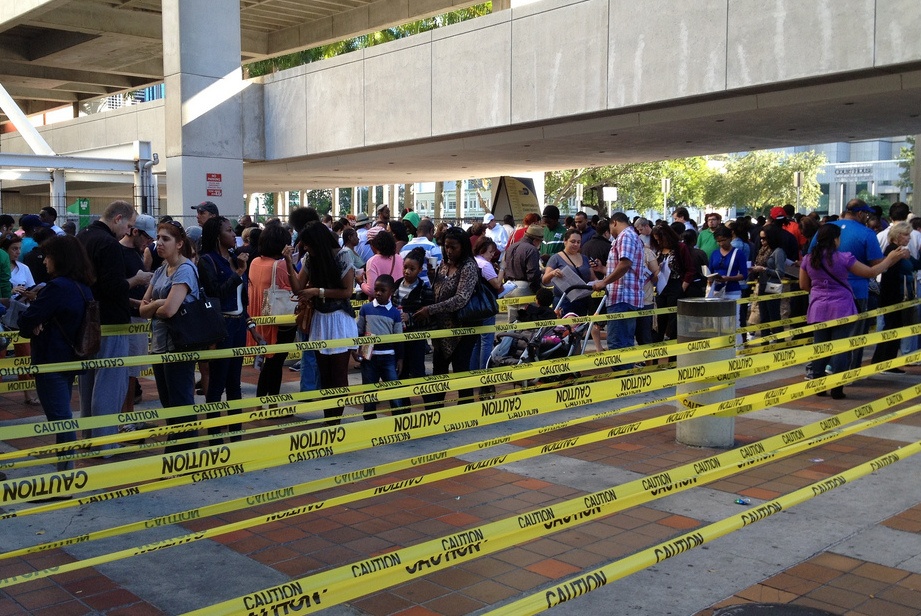Why long lines are a voting rights issue

In 2008, when reports surfaced of voters waiting in line for two, three, and, in one remarkable case in Georgia, 12 hours to vote, at Facing South we wrote about why this is a voting rights issue.
Here we go again.
Over the last two weeks, reports have flooded in of voters waiting for hours at early voting sites to cast their ballots. Florida has again dominated the headlines, with accounts of voters standing in line for up to six hours. In South Florida, Democrats sued after Gov. Rick Scott opted against extending early voting hours, as his Republican predecessor had in 2008. (Scott insisted voting was running smoothly.)
Some news reports described the huge delays as natural, even a good sign of voter enthusiasm in the democratic process. In reality, multi-hour delays at the polls are a significant voting rights problem, one that disproportionately impacts historically disenfranchised voters.
This isn't just conjecture. In its 2008 voting survey, the Census Bureau asked registered voters if they actually voted -- if they didn't, why not. The most common reason given for skipping the election was that they were too busy or had a conflicting schedule (17 percent of respondents). The second-biggest reason: an illness or disability (15 percent).
Both of those vote-deterring factors are exacerbated by long lines. The problem also disproportionately affects lower-income voters who don't have the flexibility to leave work for extended hours, or who have children but don't have the resources to pay for child care.
In effect, long lines amount to a form of poll tax, as Rachel Maddow described well in 2008:
This is a poll tax. How much do you get paid for an hour of work? Do you have the kind of job that would be delighted to give you an hour, a half-day, a whole day off work because you were waiting in line at your precinct? Even if it won't cost you your job, can you afford to not work those hours? Are you elderly or disabled, do you not have the physical stamina for this kind of exertion? This is a poll tax... Who is not in those lines -- because they can't afford to be?
It's also a problem with straightforward solutions. Reformers for years have been pushing to make Election Day a national holiday, as it is in other countries, or moving it to a Saturday.
Early voting days have been embraced in some form by 34 states and the District of Columbia. It's also been enormously popular: The Associated Press reports that about 30 million voters have already cast ballots in person or by mail for the 2012 elections.
Despite its popularity, early voting has been under attack. In dozens of states, Republicans introduced legislation that curtailed early voting and absentee voting. According to a report by the Brennan Center, early voting restrictions ended up being signed into law in Florida, Georgia, Ohio, Tennessee and West Virginia.
Florida's decision to reduce early voting days from 14 to eight days -- as well as ban Sunday voting -- has come under especially harsh fire. Gov. Scott's refusal to budge on expanding early voting hours as lines grew caused some counties to use a loophole that allowed them to open offices on Sunday for absentee voting.
That led to a show-down at one Miami-Dade site, when Republican mayor Carlos Gimenez shut down the operation with nearly 200 voters standing in line, only to re-open the center an hour later.
All of which would seem to be avoidable in a country that prides itself on both its technological prowess and commitment to democratic ideals. As Myrna Peralta, a South Florida voter who stood in line with her 4-year-old grandson for two hours, told the Miami Herald:
This is America, not a third-world country. They should have been prepared.
IMAGE: Voters waited in line for up to three hours at an early voting site in Miami on Saturday, November 3. (Photo: Phillip Pessar/Flickr)
Tags
Chris Kromm
Chris Kromm is executive director of the Institute for Southern Studies and publisher of the Institute's online magazine, Facing South.
